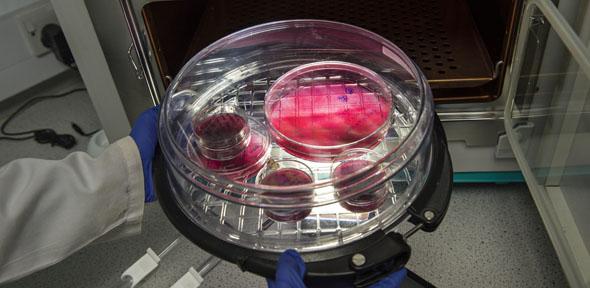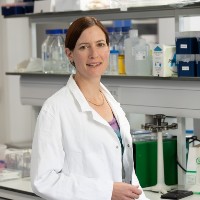
Our Research
My group studies the human malaria parasite Plasmodium falciparum. Research interests are centred around DNA biology, particularly the molecular mechanisms underlying DNA replication and cell cycle control in Plasmodium, which replicates by an unusual method called schizogony. We have studied this at both the single-cell and single-molecule levels, producing the first genome-wide maps of replication origins and replication fork activity in both P. falciparum and P. knowlesi. We are particularly interested in cell-cycle checkpoint control in Plasmodium.
I am also interested in epigenetics, including the roles that G-quadruplex DNA and RNA structures may play in the parasite - for example, in silencing and promoting the recombination of key virulence genes called var genes, whose variant expression is under epigenetic control. In fact, we have discovered that G-quadruplexes and their helicases have more general roles in genome stability/evolution in the malaria parasite, as well as influencing transcript expression at the RNA level.
I also have a long-standing interest in classical epigenetics: we are currently studying the novel phenomenon of histone lactylation in Plasmodium. This project follows on from my postdoctoral work, which focussed on a group of deacetylase enzymes called sirtuins. These regulate subtelomeric chromatin and virulence gene expression - which in turn correlate with hyperlactataemia and severe malarial disease in human patients. We are now investigating histone lactylation as novel axis of host-parasite signalling.
Alongside our research, we are actively involved in science communication, including school visits, media interviews and participation in the annual Cambridge Festival. A recent podcast interview about our ERC-funded research is found here, and a recent public engagement project is featured on a website here, or as a podcast here: 'We Shall Not Cease From Exploration - The Poetry of Research'.
Our Current Projects
- Cell cycle dynamics in Plasmodium parasites
- DNA replication, DNA damage responses and cell-cycle checkpoints in Plasmodium
- Unusual nucleic acid structures – G-quadruplexes – in DNA and RNA of Plasmodium
- RNA structures in Plasmodium
- Epigenetics and chromatin in Plasmodium
Key Publications
'Replication origin mapping in the malaria parasite Plasmodium falciparum’
Totanes, F.I.G., Gockel, J., Chapman, S.E., Bartfai, R., Boemo, M.A.*, Merrick, C.J.* Nucleic Acids Research doi.org/10.1093/nar/gkad093 (2023).
‘DNA replication dynamics during erythrocytic schizogony in the malaria parasites Plasmodium falciparum and Plasmodium knowlesi’
McDonald, J., Merrick, C.J. Plos Pathogens, 18(6): e1010595. doi.org/10.1371/journal.ppat.1010595 (2022).
'G-quadruplex RNA motifs influence gene expression in the malaria parasite Plasmodium falciparum’
Dumetz, F.*, Chow, E.Y.*, Harris, L.M., Umar, M.I., Jensen, A., Chung, B., Chan, T.F.*, Merrick, C.J.*, Kwok, C.K*. Nucleic Acids Research doi.org/10.1093/nar/gkab1095 (2021).
Key reviews:
'Checks and Balances? DNA replication and the cell cycle in Plasmodium.'
Matthews, H., Duffy C.W., Merrick, C.J. Invited review, Parasites & Vectors doi:10.1186/s13071-018-2800-1 (2018).
'G-quadruplexes in pathogens: a common route to virulence control?'
Harris, L.M. and Merrick, C.J. PLoS Pathogens 11(2):e1004562. doi: 10.1371/journal.ppat.1004562 (2015).
Professor Catherine J. Merrick
Principal Investigator
|
Nana Andoh |
Cas Boshoven |
|
|
Dr Ibtissam Jabre |
Jemima Bittor |
|
| Megan Armstrong PhD Student |
Alexandra Mwinbong |
|
|
Inaya Khan |
|
|




